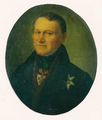Template:Selected anniversaries/January 6: Difference between revisions
No edit summary |
No edit summary |
||
| Line 79: | Line 79: | ||
||1972: Xavier Vallat dies ... French politician, was Commissioner-General for Jewish Questions in the wartime Vichy collaborationist government, and was sentenced after World War II to ten years in prison for his part in the persecution of French Jews. Pic (freaky eye patch). | ||1972: Xavier Vallat dies ... French politician, was Commissioner-General for Jewish Questions in the wartime Vichy collaborationist government, and was sentenced after World War II to ten years in prison for his part in the persecution of French Jews. Pic (freaky eye patch). | ||
||1988: Bern Dibner dies ... engineer and science historian who worked as an engineer during the electrification of Cuba. Realizing the need for improved methods of connecting electrical conductors, in 1924, he founded the Burndy Engineering Company. A few years later, he became interested in the history of Renaissance science. Subsequently, he began collecting books and everything he could find that was related to the history of science. This became a second career as a scholar that would run parallel with his life as a businessman. He wrote many books and pamphlets, on topics from the transport of ancient obelisks, to authoritative biographies of many scientific pioneers, including Alessandro Volta, inventor of the electric battery, and Wilhelm Röntgen, discoverer of the X ray. Pic. | ||1988: Bern Dibner dies ... engineer and science historian who worked as an engineer during the electrification of Cuba. Realizing the need for improved methods of connecting electrical conductors, in 1924, he founded the Burndy Engineering Company. A few years later, he became interested in the history of Renaissance science. Subsequently, he began collecting books and everything he could find that was related to the history of science. This became a second career as a scholar that would run parallel with his life as a businessman. He wrote many books and pamphlets, on topics from the transport of ancient obelisks, to authoritative biographies of many scientific pioneers, including Alessandro Volta, inventor of the electric battery, and Wilhelm Röntgen, discoverer of the X ray. Pic. | ||
| Line 96: | Line 94: | ||
||2012: Roger Boisjoly dies ... aerodynamicist and engineer. He is best known for having raised strenuous objections to the launch of the Space Shuttle Challenger months before the loss of the spacecraft and its crew in January 1986. Boisjoly correctly predicted, based on earlier flight data, that the O-rings on the rocket boosters would fail if the shuttle launched in cold weather. Pic. | ||2012: Roger Boisjoly dies ... aerodynamicist and engineer. He is best known for having raised strenuous objections to the launch of the Space Shuttle Challenger months before the loss of the spacecraft and its crew in January 1986. Boisjoly correctly predicted, based on earlier flight data, that the O-rings on the rocket boosters would fail if the shuttle launched in cold weather. Pic. | ||
</gallery> | </gallery> | ||
Latest revision as of 17:52, 7 February 2022
1561: Mathematician and physicist Thomas Fincke born. He will introduce the modern names of the trigonometric functions tangent and secant.
1655: Mathematician Jacob Bernoulli born. He will discover the fundamental mathematical constant e, and make important contributions to the field of probability.
1796: Natural scientist, explorer, and clergyman Erik Laxmann dies. Laxmann contribute to the taxonomy of Siberian fauna, and attempted to establish relations between Imperial Russia and Tokugawa Japan.
1918: Mathematician and philosopher Georg Cantor dies. He invented set theory, a fundamental area of mathematical inquiry.
1931: Inventor Thomas Edison signs his last patent application.
1990: Physicist and academic Pavel Cherenkov dies. Cherenkov shared the 1958 Nobel Prize in physics in 1958 with Ilya Frank and Igor Tamm for the discovery of Cherenkov radiation, made in 1934.





